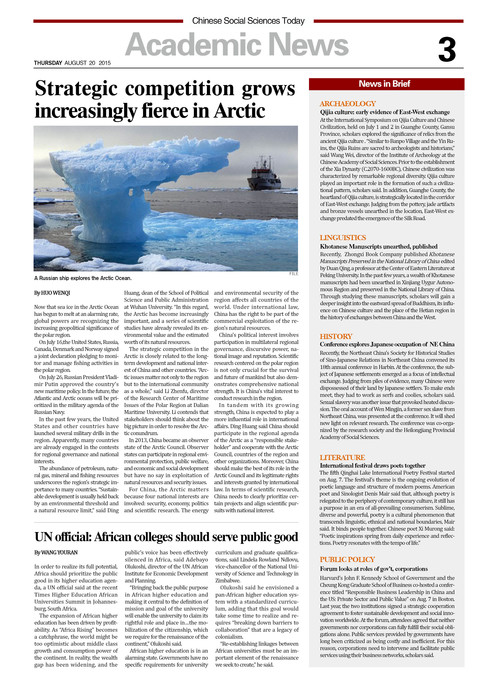Strategic competition grows increasingly fierce in Arctic
2015-08-19 15:14:38
A Russian ship explores the Arctic Ocean.
By HUO WENQI
Now that sea ice in the Arctic Ocean has begun to melt at an alarming rate, global powers are recognizing the increasing geopolitical significance of the polar region.
On July 16,the United States, Russia, Canada, Denmark and Norway signed a joint declaration pledging to monitor and manage fishing activities in the polar region.
On July 26, Russian President Vladimir Putin approved the country’s new maritime policy. In the future, the Atlantic and Arctic oceans will be prioritized in the military agenda of the Russian Navy.
In the past few years, the United States and other countries have launched several military drills in the region. Apparently, many countries are already engaged in the contests for regional governance and national interests.
The abundance of petroleum, natural gas, mineral and fishing resources underscores the region’s strategic importance to many countries. “Sustainable development is usually held back by an environmental threshold and a natural resource limit,” said Ding Huang, dean of the School of Political Science and Public Administration at Wuhan University. “In this regard, the Arctic has become increasingly important, and a series of scientific studies have already revealed its environmental value and the estimated worth of its natural resources.
The strategic competition in the Arctic is closely related to the long-term development and national interest of China and other countries. “Arctic issues matter not only to the region but to the international community as a whole,” said Li Zhenfu, director of the Research Center of Maritime Issues of the Polar Region at Dalian Maritime University. Li contends that stakeholders should think about the big picture in order to resolve the Arctic conundrum.
In 2013, China became an observer state of the Arctic Council. Observer states can participate in regional environmental protection, public welfare, and economic and social development but have no say in exploitation of natural resources and security issues.
For China, the Arctic matters because four national interests are involved: security, economy, politics and scientific research. The energy and environmental security of the region affects all countries of the world. Under international law, China has the right to be part of the commercial exploitation of the region’s natural resources.
China’s political interest involves participation in multilateral regional governance, discursive power, national image and reputation. Scientific research centered on the polar region is not only crucial for the survival and future of mankind but also demonstrates comprehensive national strength. It is China’s vital interest to conduct research in the region.
In tandem with its growing strength, China is expected to play a more influential role in international affairs. Ding Huang said China should participate in the regional agenda of the Arctic as a “responsible stakeholder” and cooperate with the Arctic Council, countries of the region and other organizations. Moreover, China should make the best of its role in the Arctic Council and its legitimate rights and interests granted by international law. In terms of scientific research, China needs to clearly prioritize certain projects and align scientific pursuits with national interest.



